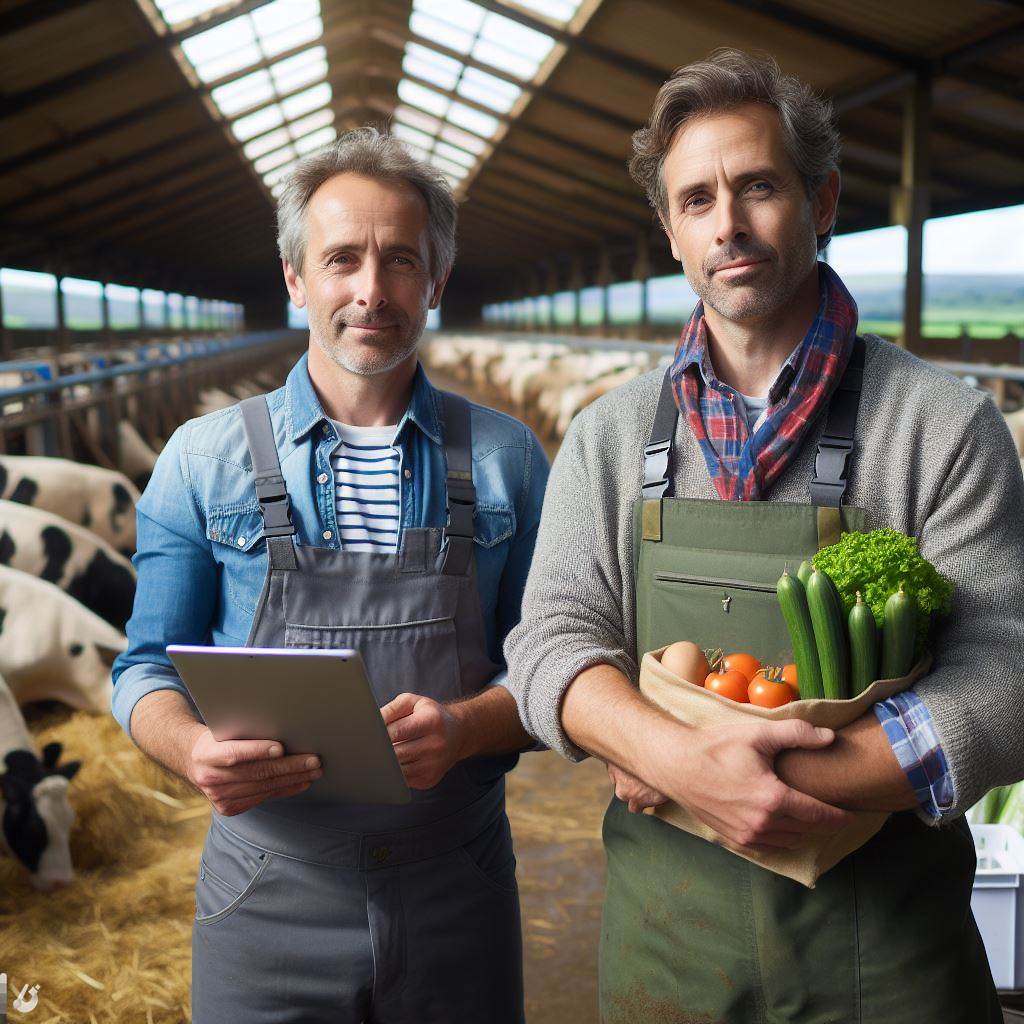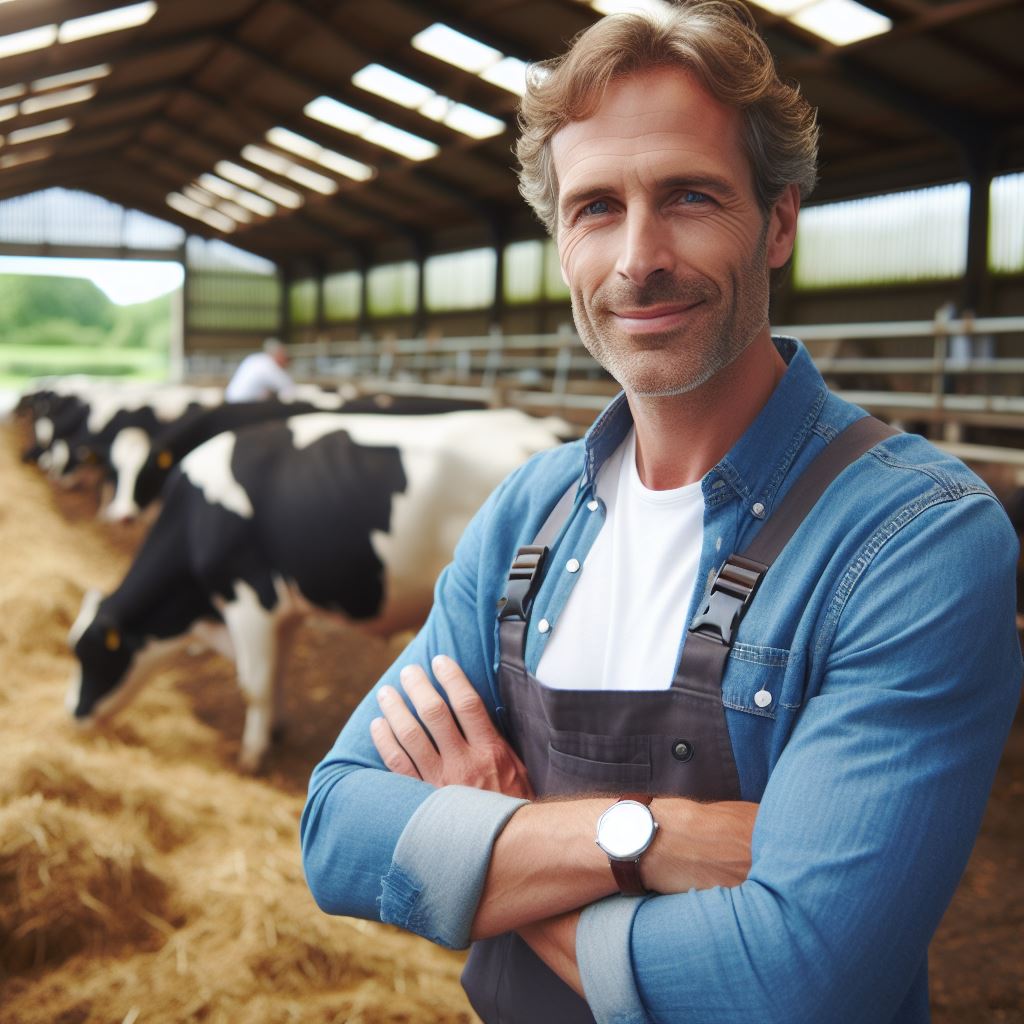Introduction
In this blog section, we will discuss the future of farm management in the UK.
Farm management involves overseeing agricultural operations to ensure efficient production and profitability.
The purpose of this blog post is to explore the upcoming trends and advancements in farm management practices.
We will cover various topics such as technology integration, sustainable farming methods, and changing consumer demands.
These points will provide valuable insights into the evolving landscape of farm management in the UK.
Importance of Farm Management
Significance of Farm Management in the Agricultural Sector
- Farm management plays a crucial role in the success and sustainability of the agricultural sector.
- It involves planning, organizing, and controlling various aspects of farm operations.
- Effective farm management ensures that resources are used efficiently and productively.
- Proper management ensures the availability of high-quality inputs such as seeds, fertilizers, and machinery.
- It helps in minimizing wastage, optimizing productivity, and reducing production costs.
- Farm management provides a structured approach to deal with challenges such as climate change, pests, and diseases.
- Efficient management practices contribute to the overall growth and development of the agricultural sector.
Role of Farm Managers in Optimizing Agricultural Production and Profitability
- Farm managers are responsible for decision-making and strategic planning on farms.
- They analyze market trends, assess risks, and make precise decisions to optimize production.
- Managers coordinate farm activities, including crop selection, planting schedules, and post-harvest operations.
- They ensure optimal utilization of resources, such as land, labor, and capital, to achieve maximum profitability.
- Farm managers monitor and evaluate performance to identify areas of improvement and implement necessary changes.
- Their expertise in financial management and budgeting helps in achieving economic efficiency.
- By implementing advanced technologies, farm managers enhance agricultural productivity and profitability.
Impact of Effective Farm Management on Sustainable Farming Practices
- Effective farm management practices promote sustainable farming methods and environmental stewardship.
- Managers prioritize conservation and preservation of natural resources, such as soil health and water quality.
- They implement precision farming techniques to reduce the use of chemicals and minimize environmental impact.
- Efficient management helps in the adoption of sustainable pest and disease control strategies.
- Farm managers actively engage in diversification and crop rotation to maintain soil fertility and reduce monocropping risks.
- They promote the use of renewable energy sources and implement waste management strategies.
- Sustainable farming practices not only benefit the environment but also improve long-term profitability.
Basically, farm management is of utmost importance in the agricultural sector. Its significance lies in optimizing production, profitability, and sustainability.
Farm managers play a vital role in decision-making and planning to achieve these objectives. Their expertise ensures the efficient use of resources and the adoption of sustainable farming practices.
Effective farm management contributes to the overall growth, prosperity, and resilience of the agricultural sector.
Current Challenges in Farm Management
Key Challenges Faced by Farm Managers in the UK
Farm managers in the UK face several key challenges that impact their daily operations and long-term sustainability.
- Rising Costs: The increasing costs of inputs such as feed, fertilizers, and machinery put pressure on farm managers’ profitability.
- Labor Shortage: Finding skilled laborers willing to work in agriculture is a challenge, which affects farm productivity.
- Changing Consumer Demands: Meeting the evolving preferences of consumers for sustainable and locally sourced food requires farm managers to adapt their production methods.
- Land Availability: Farm managers face difficulties in expanding or securing land, limiting their ability to increase production levels.
- Brexit: Uncertainty surrounding Brexit poses challenges related to trade agreements, labor availability, and access to subsidies.
Issues Related to Market Volatility, Climate Change, and Regulatory Changes
Farm managers in the UK also grapple with various issues related to market volatility, climate change, and regulatory changes.
- Market Volatility: Fluctuations in commodity prices and market demand create uncertainty and make financial planning challenging.
- Climate Change: Erratic weather patterns, increased frequency of extreme events, and changing seasons impact crop yields, livestock health, and overall farm productivity.
- Regulatory Changes: Changing regulations on issues such as land management, animal welfare, and environmental standards require farm managers to comply with new requirements and invest in necessary infrastructure or practices.
Importance of Technological Advancements
Technological advancements play a crucial role in helping farm managers tackle the challenges they face in the UK.
- Precision Agriculture: Advanced technologies enable farm managers to optimize the use of inputs, monitor crop health, and improve overall efficiency.
- Data Analytics: Farm managers can leverage data analytics to make informed decisions, identify trends, and optimize resource allocation.
- Robotics and Automation: Robotic systems and automation reduce the dependency on manual labor, improve productivity, and help overcome labor shortages.
- Renewable Energy: Farm managers can adopt renewable energy solutions like solar panels and wind turbines to reduce costs and lessen the environmental impact.
- Smart Farming: Internet of Things (IoT) and sensor technologies enable real-time monitoring of soil moisture, temperature, and animal health, enhancing decision-making processes.
Essentially, farm managers in the UK face various challenges, including rising costs, labor shortage, changing consumer demands, land availability, and Brexit uncertainties.
Market volatility, climate change, and regulatory changes further add to their difficulties.
Technological advances, like precision agriculture and robotics, provide solutions for farming challenges, promoting efficient and sustainable farm management.
Read: Forestry Careers: Paths and Progressions
Personalized UK Career Consulting
Receive tailored career guidance designed just for you. Get actionable steps and expert support to boost your career in 1-3 days. Take control of your career now.
Get StartedFuture Trends in Farm Management
Technologies and their potential impact on farm management
- Precision agriculture and the utilization of data analytics have revolutionized farm management.
- Automation and robotics in farming operations have increased efficiency and reduced labor requirements.
- Artificial intelligence and machine learning applications are transforming how farms operate and make decisions.
Smart farming and its implications for farm management
- The integration of IoT devices and sensors in day-to-day operations has enabled real-time monitoring and control.
- Predictive analytics based on data collected from various sources provide valuable insights for improved decision-making.
Sustainable practices and environmental stewardship
- Farms are increasingly adopting sustainable practices to preserve natural resources and minimize environmental impact.
- Investments in renewable energy sources and efficient irrigation systems contribute to sustainable farm management.
- Emphasizing environmental stewardship ensures the long-term viability of farms and their surrounding ecosystems.
In short, future trends in farm management are driven by emerging technologies such as precision agriculture, automation, artificial intelligence, and machine learning.
These advancements enable farms to operate more efficiently, make data-driven decisions, and optimize resource utilization.
The concept of smart farming, with the integration of IoT devices and predictive analytics, further enhances farm management capabilities.
Additionally, sustainable practices and environmental stewardship play a crucial role in ensuring the long-term success and preservation of farms and their surrounding environment.
Read: UK Farming Subsidies: Understanding the Basics

Skillset and Education for Future Farm Managers
Evolving Skill Requirements for Farm Managers
- Farm managers need to possess a diverse skillset to adapt to the changing landscape of agriculture.
- Skills such as data analysis, technology utilization, and sustainability management are becoming increasingly important.
- Farm managers must be able to understand and implement precision agriculture techniques to optimize resource utilization.
- Effective communication and leadership skills are vital for managing teams and collaborating with stakeholders.
- Flexibility and adaptability are essential to quickly respond to market fluctuations and technological advancements.
Need for Agricultural Education Programs to Adapt
- Agricultural education programs must keep up with the changing demands of the industry.
- Curricula should incorporate courses on emerging technologies, sustainable practices, and business management.
- There is a need to foster practical skills by offering hands-on training and internships.
- Collaboration between agricultural education institutions and industry stakeholders can bridge the gap between academia and practice.
- Encouraging interdisciplinary approaches can provide students with a broader understanding of the agricultural system.
Importance of Lifelong Learning and Continuous Professional Development
- Lifelong learning is crucial for future farm managers to stay updated with industry advancements.
- Continuous professional development programs can enhance existing skills and allow for ongoing improvement.
- Farm managers should actively seek opportunities for learning and networking to expand their knowledge and stay competitive.
- Professional certifications and accreditations can validate skills and demonstrate a commitment to ongoing education.
- Industry conferences, workshops, and online platforms can serve as valuable resources for staying current in the field.
I essence, the future of farm management in the UK calls for farm managers with evolving skillsets.
They need to be equipped with skills in data analysis, technology utilization, communication, and leadership.
Agricultural education programs must adapt to these changing demands by incorporating courses on emerging technologies and sustainable practices.
Lifelong learning and continuous professional development are essential to stay updated with industry advancements.
Future farm managers must actively seek learning opportunities and participate in industry events to expand their knowledge and stay competitive.
Read: UK Crop Farming: Trends and Techniques
Opportunities and Prospects for Farm Management Careers
Potential Career Paths and Job Opportunities
Choosing farm management as a career unlocks diverse opportunities in the dynamic agricultural sector. It offers roles in traditional farming as well as emerging areas like sustainability, technology, and business.
- Agronomists, focusing on crops, analyze soil, recommend inputs, and develop techniques for optimal yield, crucial for sustainable practices.
- Livestock managers oversee animal care, breeding decisions, and regulatory compliance, requiring expertise in welfare, nutrition, and genetics.
- Rural business consultants, with business and consultancy skills, aid farmers in financial management, marketing, and succession planning for operational optimization.
- Agricultural economists analyze market trends, commodity prices, and trade policies, guiding farmers in informed decision-making for sustainability and profitability.
- Farm equipment sales representatives assist farmers in choosing machinery, providing technical support, and staying updated on the latest advancements.
- Organic farm inspectors ensure compliance with organic standards, assessing soil management, pest control, and record-keeping to meet certification requirements.
- Farm policy analysts play a crucial role in shaping agricultural policies, monitoring changes, assessing impacts, and providing recommendations based on a comprehensive understanding of the sector.
In this vibrant field, the rise of technology and the demand for sustainability create diverse roles, making farm management a compelling and impactful career choice.
The Importance of Entrepreneurship and Diversification in Modern Farm Management
The modern farm manager needs to be entrepreneurial and open to diversifying their operations beyond traditional farming.
Your Dream Job Starts with a Perfect CV
Get a tailored CV and cover letter that captures your unique strengths and stands out in your industry. Let us help you make an unforgettable first impression.
Get StartedAgricultural businesses are constantly evolving, and embracing innovation and diversification can provide significant benefits.
Entrepreneurship allows farm managers to identify new market opportunities and explore innovative farming techniques.
By thinking creatively, farm managers can tap into niche markets, such as organic or specialty crops, to differentiate themselves and increase profitability.
They can also utilize technology to improve efficiency and reduce costs.
Diversification is equally important as it helps spread risk and protects against market fluctuations.
Farm managers can diversify their income streams by venturing into areas like agritourism, on-farm product sales, or value-added processing.
These diversification strategies provide additional revenue sources and help withstand external shocks.
Moreover, diversification enhances sustainability by reducing a farm’s environmental impact.
For example, incorporating renewable energy infrastructure, such as solar panels or wind turbines, can not only provide energy for on-farm operations but also generate extra income through selling excess power to the grid.
Brexit on the Agricultural Sector and Farm Management
Brexit has introduced a level of uncertainty and challenges for the agricultural sector and farm management in the UK.
The withdrawal from the European Union has significant implications for trade, subsidies, and labor availability.
One of the major concerns is the potential disruption to agricultural trade. The UK’s departure from the EU’s common agricultural policy means that farmers could face trade barriers, tariffs, and increased competition.
Farm managers need to adapt to new market conditions and explore alternative trading partners to maintain profitability.
Subsidies also play a crucial role in farm management. Historically, EU subsidies have provided financial support to farmers, ensuring their economic viability.
Optimize Your LinkedIn for Success
Boost your LinkedIn profile with a professional bio, keyword-rich headline, and strategic recommendations that attract recruiters. Stand out from the crowd and get noticed.
Optimize NowWith Brexit, the future of subsidies in the UK agricultural sector is uncertain. Farm managers must prepare for potential changes in funding models and explore other sources of financial support.
Another significant concern is the availability of labor.
The agricultural sector heavily relies on migrant workers, particularly for seasonal harvesting and other manual tasks. Changes to immigration policies post-Brexit may impact the sector’s labor force.
Farm managers must find innovative ways to attract and retain skilled workers or invest in automation and technology to mitigate labor shortages.
Despite the challenges, Brexit also presents opportunities for UK farmers.
The country can now tailor agricultural policies to its specific needs and focus on sustainable and locally-driven food production.
Farm managers can seize these opportunities by adapting their operations to meet changing consumer demands and exploring new markets.
In essence, the future of farm management careers in the UK holds immense potential.
By embracing entrepreneurship, diversification, and adapting to post-Brexit changes, farm managers can capitalize on opportunities to lead the agricultural sector into a prosperous future.
Read: Brexit and UK Farming: Changes and Effects
Conclusion
In closing, we’ve explored the evolving landscape of farm management in the UK.
Embracing technological advancements, sustainable practices, and diverse career opportunities are pivotal.
Adapting to these changes is not merely beneficial but imperative for the future of agriculture.
The significance lies in steering farms towards efficiency, resilience, and profitability.
As challenges like climate change and market dynamics persist, a proactive approach is essential. Are we ready to cultivate innovation and resilience in our farms?
The future demands not just attention but active participation. Let’s sow the seeds of progress and reap a harvest of sustainable and thriving farm management.
How will you contribute to shaping the future of agriculture in the UK? The answer lies in our collective commitment to a forward-thinking and resilient farm management ethos.
[E-Book for Sale]
500 Cutting-Edge Tech Startup Ideas for 2024 & 2025: Innovate, Create, Dominate
$19.99 • 500 Tech Startup Ideas • 62 pages
You will get inspired with 500 innovative tech startup ideas for 2024 and 2025, complete with concise descriptions to help you kickstart your entrepreneurial journey in AI, Blockchain, IoT, Fintech, and AR/VR.




